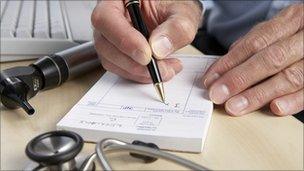Prescription charges abolished in Scotland
-
Published
-
comments

Scotland has joined Northern Ireland and Wales in abolishing prescription fees - leaving England as the only part of the UK to charge for them.
No one in Scotland will have to pay for prescribed medicines following the move brought in by the SNP government.
It comes on the same day charges per item rise in England by 20p to £7.40.
But despite the charge, 90% of items dispensed are given out free as children, those on low incomes and cancer patients are exempt.
Prescription charges have been falling in Scotland for the last three years and stood at £3 before the 1 April change, which will mean the Scottish government losing out on £57m a year.
Under devolution, Wales was the first part of the UK to make prescriptions free - four years ago - and Northern Ireland followed in 2010.
Scotland's Health Secretary Nicola Sturgeon said: "An SNP government, working for Scotland, has ended prescription charges which were a tax on ill-health saving those with long term conditions around £180."
Prescriptions were free for all when the NHS was set up in 1948, but charges were introduced in the early 1950s to plug gaps in funding.
The Department of Health defended its policy of charging in England.
It said the fees raised more than £450m a year - equivalent to the salary costs of 18,000 nurses or 3,500 hospital consultants.
Pre-payment deal
A spokeswoman said: "This income helps the NHS to maintain vital services for patients."
And she added alongside the exemptions those needing regular prescriptions, such as patients with long-term conditions, were eligible for discounted rates.
The spokeswoman said: "The price of the 12-month prescription pre-payment certificate will be frozen for the second year running. This allows people to get all the prescriptions they need for an average cost of £2 per week."
Responding to the fact England stands alone in charging for prescriptions, Roger Goss, of Patient Concern, said: "Patients in England will be asking if this is fair. They are being discriminated against and losing out. It should be the same across the NHS."
The move to end the fees north of the border comes in the second week of campaigning for the Scottish Parliament election on 5 May.
The Scottish Labour Party said it welcomed the move.
Its health spokesperson Jackie Baillie said: "This is something that we supported in the Scottish Parliament and would not come to fruition without that support."
Derek Brownlee, finance spokesman for the Scottish Tories said that giving free prescriptions to those people who could "well afford to pay for them" was "politically irresponsible and a drain on public resources at this time of huge financial challenges in the NHS".
He added "The young, the elderly and those on benefits are all already exempt. Using millions of Scotland's health budget to reduce the cost of prescriptions to zero by next year means it cannot be spent elsewhere."
The Scottish Liberal Democrats said it would take forward "what we've inherited on free prescriptions" but it added that the SNP could not have it both ways.
A spokesperson said: "They cannot scrap prescription charges and also continue paying out £28 million of bonuses to the highest paid employees in the NHS."
The Scottish Greens said it believed there should be equal access to the NHS and that meant free access to everyone at the point of use, including free prescriptions.
The party's co-convener Patrick Harvie added: "We fully support the abolition of prescription charges. This kind of move will become harder to sustain, though, if none of the other parties are prepared to support our call to bring in fairer taxes and protect public services."
-
-
Published4 July 2008
-
-
-
Published1 April 2007
-
-
-
Published10 April 2006
-